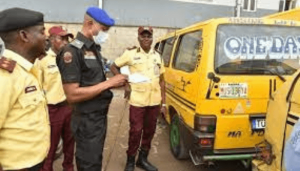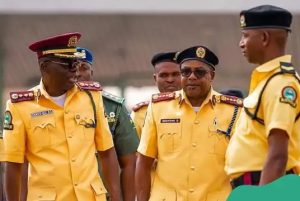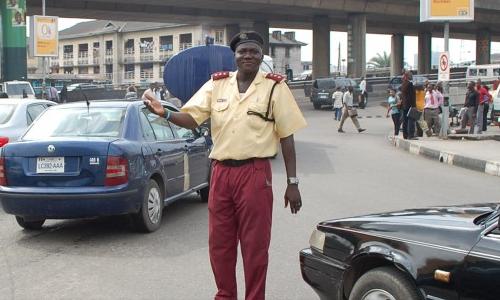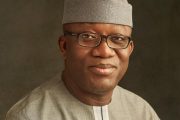Wednesday, December 11th, 2024 turned out “A bad day in Lagos” for Dr. Yusuf Bangura, visiting Sierra Leonean and ex-ABU, Zaria scholar and his wife, Kadie. He tells the story in his own words. Note though that, despite the terrible experience with the traffic police as narrated below, Bangura still feels that Lagos is a much improved city compared to how it was when the family lived in Nigeria in the 1980s. He didn’t feel stressed or threatened when moving around even in overcrowded areas or places like Ijora, which the driver considered rough and unsafe.
We were victims of hyperactive police power in Lagos today. We had planned to spend 5-6 hours at five cultural, historical and entertainment sites in Lagos Island, Victoria Island and Lekki. We chose Freedom Park, Terra Kulture, Nike Centre for Culture and Art, Lekki Conservation Centre, and Lekki Leisure Park.
What would have been our sixth choice, the beautiful Landmark Beach, no longer exists. We were given the sad news when we went there two days ago after visiting Eko Atlantic. It’s one of the victims of the 700-kilometre coastal road that will connect Lagos and Calabar in the far east, passing through several Nigerian states (Ogun, Ondo, Delta, Bayelsa, Rivers, and Akwa Ibom).

LASTMA operatives at work in the city generally called a jungle
Our driver informed us that the best time to travel in Lagos is between 10:00 and 16:00. We, therefore, decided to set out at 10:00 and allocated about five and half hours to the tour. We wanted to beat Lagos’ notoriously heavy after-work traffic, which we have so far largely succeeded in doing.
However, we had barely done 15 minutes on the road when a group of traffic police officers appeared and instructed our driver to park the car. We thought that this was just a routine check that would not involve any delay. We were terribly wrong. Christmas is less than two weeks away. The police were on the hunt, seemingly everywhere, stopping drivers at random and making a killing.
Their first question was whether our driver had a license. When they realised that he had one, they quickly moved in front of the car, saw a few minor cracks on the windscreen and told the driver that the car would be confiscated and taken to their station because of the cracks. The car key was taken from the driver and one of the officials jumped into the car and took control of it. We were stunned.
We told the head of the group, a short and stocky officer, that we were visitors, had scheduled meetings for the day, and pleaded with him to release the car. He told me not to intervene and would only deal with the driver. After about 30 minutes of pleading, our driver gave up and allowed them to take the car to the station. We remained in the car and drove to the station with the police officer mandated to drive the car.
I suspected that if the car was taken to the station the cost of retrieving it would be high as there would be other interests at the station that would want to partake in the ‘settlement.’ When we got to the station, several officials came out to inspect the cracks on the windscreen. The stakes were raised. The officials were adamant that they would not release the car until a fine was paid.
Our driver realised that even if he paid the money, they would still tell him to report tomorrow to retrieve the car. He would then be asked to pay a demurrage fee for the extra day.

It should be possible to inculcate in LASTMA, FRSC and other traffic police outfits across Nigeria that in the traffic anywhere in the country at any time of the day could be a visitor to Nigeria taking note of how we conduct business?
Our driver tried to make alternative arrangements for us to continue our tour, but the person he thought he could mobilise had also been nabbed by the police.
He was determined not to pay the demurrage fee. He left the station and went to see a police officer he knew in another building and asked him to help. The officer called the station and those who had impounded the car agreed to release it after the fine had been paid.
There were two kinds of fine: a legal fine that involved paperwork, which was paid in a bank. This was N20,000 (about USD12); and an undocumented fine of N30,000 (about USD18), which was given to the officers at the station. We spent a total of two hours and forty five minutes with the officers before the vehicle was released.
Even though the entire scheme looked farcical, it was clearly logical. If the traffic police were to be diligent in enforcing road safety rules, most vehicles in Lagos would be impounded. However, the police do not have the capacity to police all vehicles, let alone impound them. So they occasionally do random checks to arrest a few wrongdoers. The goal is not to deter wrongdoing but to demonstrate that some work is being done while they’re also busy making money.
The unlucky drivers who got caught pay the price and the farcical process continues. The officials know that most cars have one or more problems. It’s a captive market for the police. They start with the low-hanging fruits—asking for licenses—and aggravate the problem to other, even minor, issues if they fail to trap drivers with their first demand.
We thought our problem was over after the driver had paid the fine and the car had been released. But we were confronted with a new problem. The back tyres of the car had been deflated. The driver told us that vulcanisers collude with people at police traffic stations to deflate tyres when cars are taken to stations. The price the vulcanisers charge for reflating the tyres is twice the price they charge in the open market. Our driver had to call a vulcaniser, who operated just outside the building, to reflate the tyres.
By the time we left the station it was already 13:08. This left us with only two and half to three hours to explore our selected sites. We decided to visit only Freedom Park and the fabulous Terra Kulture.




























